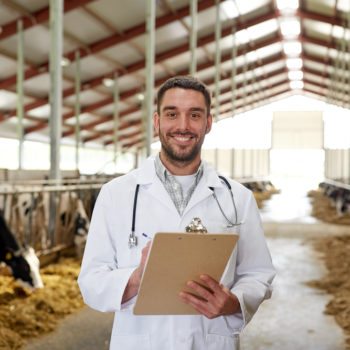Why We Love It
-
$77,190Potential Avg. Salary*
* Salary & growth data is based on the recent Bureau of Labor and Statistics data published at https://www.bls.gov/oes/current/oes191029.htm for 19-1029 Biological scientists, all other 11/2021. Based on national data, not school-specific information. Conditions in your area may vary.
A bachelor of science in biology is a broad degree program that prepares students for a wide variety of careers in the research and development, healthcare, conservation, and education industries.
By studying life in all of its forms—including humans, animals, vertebrae, and plants—you’ll gain the basic education needed to find work as a doctor, engineer, veterinarian, marine biologist, and many more.
What is a Degree in Biology?
In a biology bachelor’s degree program, students generally choose a specific concentration that guides their course of study in college. Depending on their career goals, students may focus on cellular biology and physiology, organism biology and ecology, or sub-cellular biology and genetics.
While all students take general biology courses and study elements of all three concentrations, the concentrations guide students in coursework that leads them to success in their desired careers after graduation.
A biology degree is the study of life, and the concepts learned in a biology program allow students to move into careers designed to sustain and promote life. Many use a bachelor’s degree in biology as a basis for the graduate degrees required to work as doctors, veterinarians, researchers, and marine biologists.
Others go to work after earning a bachelor’s degree, becoming research assistants, botanists, or medical technologists. Biology is a multi-faceted degree that prepares students for a wide variety of careers in scientific disciplines and industries.
Recommended Schools
What Courses Would I Take For a Major in Biology?
- Statistics and Data Sciences
- Physics
- Microbiology
- Chemistry
- Ecology
- Behavioral and Comparative Physiology
- Genetics
- Marine Science
What Jobs Can You Get with a Degree in Biology?
Because of the diversity of careers that a biology degree prepares graduates for, there are a nearly unlimited number of opportunities for graduates. Those moving into careers in the medical field have a particularly promising future because of the expected increase in demand for healthcare professionals in the coming decades.
High numbers in aging populations are expected to significantly increase the demand for medical staff, so students may have an advantage if focusing their studies on human biology.
How Long does it take?
A bachelors in Biology will have a typical length of 4 years in a full time schedule. That said, there are many ways to speed up the timeframe by either taking more units via online coursework, community college, or taking free classes at OnlineDegree.com that could transfer to universities in the US.
Online Biology Degree
Online bachelor’s degree programs in biology are offered by a number of different universities. Students can complete the courses online and participate in virtual labs. They are also required to complete a research project for graduation. Earning a bachelor’s degree requires completing around 120 credit hours.
There are also master’s degree programs available. However, it should also be noted that online programs do not offer the same practical experience as that offered by working in actual labs.
What Can You Do With a Biology Degree?
Biology is the study of living organisms and life. Biology students focus on studying the physical structure, chemical and physiological processes, molecular interactions, evolution and development of biological systems. Modern biology is based on 5 main concepts which are cell theory, evolution, homeostasis, energy and genetics.
Studying biology attracts many students who want to enjoy the amazing diversity of this universe and develop solutions to maintain this diversity. Studying biology provides scientific knowledge for many other disciplines including for example medicine, agriculture, ecosystems and artificial intelligence.
What does a biology student learn?
Studying life and living organisms is a vast field that needs to be viewed in many different ways. For example, students need to understand how cells communicate using chemical signals, how organisms grow and develop or what causes diseases or death. The following list shows the most important courses in biology degree programs:
- Cytology: studying cells as the building unit of all living organisms. This branch focuses on the cells as an independent unit showing the various types of cells, sub-cellular structures and cell membranes.
- Genetics: studying the mechanisms through which cells and living organisms inherit their characteristics. This includes studying the hereditary materials including the DNA and RNA.
- Molecular genetics: studying the cellular processes on the molecular levels. Biological molecules include enzymes, proteins, nucleic acids, lipids and much more. These molecules are responsible for building the structure of living organisms, controlling biological functions and signaling between cells and organisms.
- Anatomy: studying the physical structure of living organisms and their organs and tissues.
- Physiology: studying how organs function in the normal state and how they respond to external or internal changes or stimulants.
- Evolutionary biology: studying the biological diversity of life based on the principles of the evolution theory that was proposed by Charles Darwin.
- Taxonomy: studying the classification and naming of living organisms. Living organisms are classified into domains, kingdoms, phyla, classes, orders, families, genera and species.
- Ecology: studying the biological systems on the macro levels by studying the interactions between living organisms in a certain environment or ecosystem.
Now I have a biology degree…where can I work after graduating?
If you have a passion for science and living organisms, then you will probably enjoy studying biology. Biology can be an alternative way to work in the medical and pharmaceutical fields.
However, career options for biology graduates are not limited to this. The following list shows examples of jobs that you may consider after earning your biology degree but you may always come up with your own different choice.
- Biological technicians: they work with researchers in graduate schools, research institutes or pharmaceutical companies. Their role is to perform tests on biomolecules, cells and animal models to provide reproducible and trustworthy data.
- Biochemists: most of the jobs in this field require having an advanced degree as a master’s or doctoral degree. Biochemists may work in biotechnology and biomedical companies. They can also work in medical diagnostic labs measuring biomarkers that can indicate the existence of certain health conditions.
- Genetic counselor: there is increasing awareness regarding the role of genetics in diseases. Genetic counselors can evaluate the probability of inheriting genetic diseases. They also work with legal courts to determine criminals.
- Health educators: they work to communicate medical and health information to the community. Their role is particularly important during an outbreak of new diseases or epidemics. They should have the skills needed to simplify complex medical information.
- Pharmaceutical or medical sales representatives: their role is to explain the advantages and potential of pharmaceutical or medical products to healthcare professionals to boost the sales of these products. They also explain the precautions and the proper way to use these products.
- Teacher or researcher in the academic and educational field.
Should I choose a biology degree?
Studying biology is not an easy task but it can also be much fun if you have the passion for it. Biology courses can vary significantly from each other. Accordingly, biology graduates develop a number of skills that are important for employees.
- General laboratory skills including a high level of handling, lab safety and documentation skills.
- Data organization and analysis: biological experiments provide raw data that require proper organization and analysis to reach conclusions.
- Organization and time management: working with cells or animal experiments requires strict time planning and organization skills which are always useful.
- Excellent scientific reading and writing
- Resource planning and management are essential parts of all biological experiments.
Recommended Schools
Best Jobs for Biology Degrees
A degree in biology is a broad program that prepares students for further education as well as a broad number of options to qualify for positions in the sciences.
Students can work as research and medical technologists and assistants after graduation, or they can continue their educations to earn graduate degrees and find work as doctors, dentists, veterinarians, marine biologists, teachers, or researchers.
How to save time and money
Our mission is to help you to avoid paying full price for college. We want your Biology degree to be affordable and accessible. Here’s how you could save:
Create Your Free SmartPlan

There are many ways to make college affordable and accessible.
That’s why we created a helpful tool called SmartPlan.
It’s free, and helps you find potential ways to save and tons of information about each school you’re considering
Think of it as your “college blueprint”, to help you instantly craft a path to your degree:
- Which Colleges Match Your Needs
- Ways You Could Save Time & Money
- Free Courses You Could Take for Credit
- Valuable Data and Insights on Each College
- Detailed Steps You Should Take!
See what’s possible for you and generate a free plan within just a few minutes
Create My SmartPlanYou Might also be Interested in
Many visitors who look for a degree in Biology are also interested in the following degrees.












